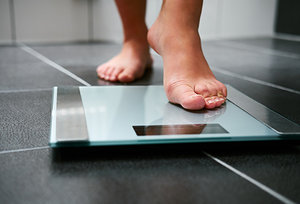Five Safe, Science-Backed Ways to Lose Weight Without Medication
By Editorial Staff
Weight-loss medications, including GLP-1 drugs, can help some people shed pounds temporarily. But they often come with side effects, high costs, and the challenge of maintaining weight once the medication is stopped.
For most people, sustainable, drug-free strategies remain the safest and most effective path to lasting weight management. Here are five science-supported ways to accomplish your weight-loss goals:
1. Focus on Whole, Nutrient-Dense Foods
Diets rich in vegetables, fruits, whole grains, lean proteins, and healthy fats support weight loss and long-term health.
Tip: Fill half your plate with vegetables and fruits at each meal, choose whole grains over refined carbs, and include lean proteins like fish, poultry, beans, or tofu. The USDA's MyPlate guidelines recommend this type of balanced diet to support healthy weight and reduce the risk of chronic disease (www.myplate.gov/).
2. Control Portions and Practice Mindful Eating
Even healthy foods can contribute to weight gain if portions are too large.
Tip: Avoid distractions like screens during meals, pause between bites, and check in with yourself before taking seconds. The Centers for Disease Control and Prevention (CDC) notes that paying attention to hunger and fullness cues is an effective strategy for maintaining a healthy weight (www.cdc.gov/healthyweight/losing_weight/index.html).
3. Move Your Body Regularly
Physical activity burns calories, builds lean muscle, and supports metabolism.
 Tip: Adults should aim for at least 150 minutes of moderate-intensity exercise per week, such as brisk walking, swimming, or cycling, plus 2-3 strength-training sessions weekly. The Physical Activity Guidelines for Americans recommend this amount for weight management and overall health (https://health.gov/paguidelines/).
Tip: Adults should aim for at least 150 minutes of moderate-intensity exercise per week, such as brisk walking, swimming, or cycling, plus 2-3 strength-training sessions weekly. The Physical Activity Guidelines for Americans recommend this amount for weight management and overall health (https://health.gov/paguidelines/).
4. Prioritize Sleep and Manage Stress
Poor sleep and chronic stress can disrupt appetite and metabolism, making weight loss harder.
Tip: Try to get 7-9 hours of sleep each night, maintain a consistent bedtime, and incorporate stress-reducing practices like meditation, yoga, or deep breathing. The National Institutes of Health (NIH) emphasizes that adequate sleep and stress management support weight control and overall wellness (www.nhlbi.nih.gov/health/educational/lose_wt/).
5. Track Progress and Set Realistic Goals
Monitoring habits and outcomes improves accountability and long-term success.
Tip: Set achievable goals, such as losing 1-2 pounds per week, and use journals or apps to track meals, activity and progress. The CDC recommends self-monitoring as a key tool for safe and effective weight management (www.cdc.gov/healthyweight/losing_weight/index.html).
Why Lifestyle Beats Medication for Long-Term Results
GLP-1 medications may facilitate short-term weight loss in some cases, but once the medication is stopped, weight may return because the lifestyle behaviors that contributed to weight gain haven't been addressed. By contrast, lifestyle strategies recommended by the USDA, CDC and NIH help improve metabolism, cardiovascular health and overall wellness – benefits that persist long after weight is lost.
Bottom line: Safe, drug-free weight loss is achievable. By following expert-backed tips on nutrition, activity, sleep, stress management, and mindful habits, you can achieve sustainable weight loss and better overall health – without relying on medication.

